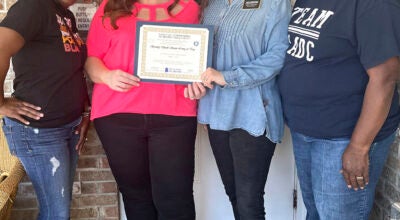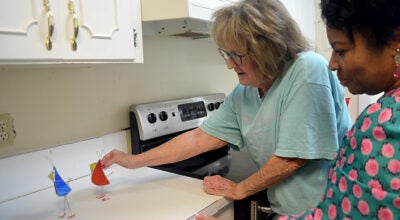HIPPY program moves into second year
Published 11:00 pm Friday, October 7, 2011
With a successful first year under its belt, the HIPPY program in Pike County is continuing to help families.
The Home Instruction for Parents of Preschool Youngsters (HIPPY) program graduated 38 4-year-old participants last year, said Vickie Reeves, coordinator.
This year, despite a 50 percent cut in funding, the program is continuing to work with 19 of those students, all of whom are now in kindergarten at Troy Elementary or Pike County Elementary.
“We don’t teach the children,” Reeves said. “We teach the parents how to teach their children.”
The Pike County program is based on the national model of a preschool intervention program. It’s overseen locally by the Troy Pike Early Learning Foundation as a result of nearly three years worth of research and work by educators and retired educators, including Reeves. She taught kindergarten and first grade in the Pike County schools for 25 years before retiring.
“I taught first grade for 14 years before asking to be moved to kindergarten,” she said. “For me, being in the classroom, I realized that when (students) came to first grade, if they didn’t have what they needed in kindergarten, they struggled. They have to get it at the very beginning.”
And giving all children an equal opportunity at learning is a goal of the HIPPY program. “All children can learn,” Reeves said. “It depends on who has the best experiences.”
The HIPPY program is a home-based, school readiness program for parents of 3-, 4- and 5-year olds. “They recommend that you complete at least two years of the curriculum,” Reeves said. “We started with 4-year-olds last year and are working with them this year for the second year of the curriculum.”
The program provides 30 weeks of lessons and activities for parents to utilize in their homes. “They spend 15 minutes a day working with their children and teaching them,” Reeves said. “That’s all it takes.”
Each week in the 4-year-old program and every other week in the 5-year-old program, HIPPY workers go to the homes of the participating families to work with the parents and share the curriculum and information.
“Like anything, the parents have to be involved,” Reeves said.
But when they do get involved, the students excel. “Our students this year were very well prepared for kindergarten,” Reeves said.
HIPPY began in 1969 in Israel as a research and demonstration project. It spread internationally and came to the United States in 1984. More than 28 counties in Alabama utilize the program.
“The HIPPY curriculum follows the Alabama Course of Study, so the children are learning the skills necessary for prerequisites for reading readiness and math skills and they also have science activities.”
And while participation in the program is free to the families, the materials and program cost about $1,250 per student per year, according to the national averages.
Here in Pike County, the program was funded in the 2010-2011 school year by both the Pike County Schools and the Troy City Schools equally: each invested $50,000 in it.
This year, though, the Pike County Schools had to eliminate the HIPPY funding from the 2011-2012 budget. “Everything was tight and they had to make difficult cuts,” Reeves said. “The Pike County Schools do give us a lot in in-kind donations, though.”
With funding cut in half, the foundation that oversees the HIPPY program made the decision to reduce staff by 50 percent, as well. “This year, we have only two people making home visits in Troy and one in Brundidge.”
Instead of taking new 4-year-olds into the program, it is working only with the 5-year-olds on the second year of the curriculum cycle. “Next year, we’ll pick back up with the 4-year-old curriculum,” Reeves said.
Organizers expect the program to take about three years to solidify its presence in Pike County. “People hear our name, because HIPPY is an unusual name, but we want them to understand the program and know about the good it’s doing,” Reeves said.





